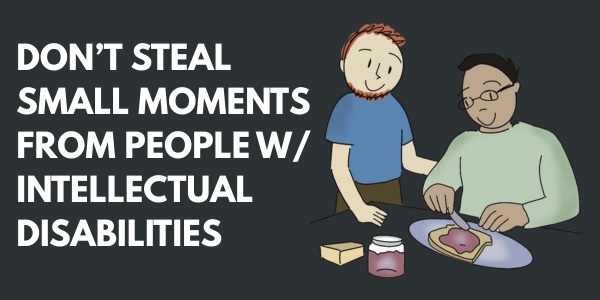
I was visiting Michael, a man in his fifties who had a developmental disability one morning when I saw something that made me stop in my tracks.
The support staff, young and new to the job, was standing in the kitchen with Michael. Michael was sitting at the table, bread in front of him, butter, jam, and a knife all laid out.
What caught my eye was not what was happening, but what wasn’t happening.
The worker wasn’t doing for.
He wasn’t rushing.
He wasn’t taking over.
Instead, he was standing just a little off to the side, leaning against the counter. He wasn’t passive, he was watching with a kind of gentle focus, offering small prompts when they were needed.
“That’s right Michael. Take your time.”
“Nice, job Michael.”
It would have been faster, much faster, if the worker had done it for Michael. Michael’s movements were slow and sometimes awkward. The butter was spread unevenly. A little jam slid off the toast onto the table.
But Michael smiled the whole way through.
He looked at the finished toast, his toast, and then looked up at the worker. “Good” he said.
And the worker, without fanfare, said, “Yeah, nice one Michael.”
It was such a small moment. A piece of toast. But it’s these small moments that often get stolen from people with intellectual and developmental disabilities. The ordinary acts of making food, choosing clothes, turning on the television. Often those things are done for people instead of with them.
Weeks earlier the young support person had completed a training on a concept called Active Support. Active Support isn’t about creating big dramatic changes. It’s about understanding that every moment has potential. Especially these tiny, deliberate choices, to wait, to guide, to encourage, instead of stepping in.
That morning, Michael didn’t just get breakfast. He got dignity, control, and the quiet joy of doing something for himself.
And all it took was a worker willing to hold back, to stand beside rather than in front.
Active Support is a 130 minute module available to members of Open Future.
Want to see how Open Future Learning can work for your team? Click here to schedule a Zoom demo.
P.S. Open Future is now SCORM compliant. Use our courses on any LMS!

